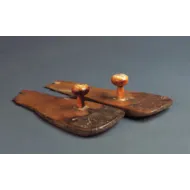A pair of Wood and Ivory 'Padukas' the toe knob sandal of the Indian Mendicant 'Sadhu'
A pair of Wood and Ivory ‘Padukas’ the toe knob sandal of the Indian Mendicant
‘Sadhu’
17th – 18th Century
Size : 25 cm long, 9 cm wide, 6 cm high – 9¾ ins long, 3½ ins wide, 2¼ ins high
DEFRA registered (de minimus items) no. 7EWA8DQA
‘Sadhu’
17th – 18th Century
Size : 25 cm long, 9 cm wide, 6 cm high – 9¾ ins long, 3½ ins wide, 2¼ ins high
DEFRA registered (de minimus items) no. 7EWA8DQA
A pair of Wood and Ivory ‘Padukas’ the toe knob sandal of the Indian Mendicant
‘Sadhu’
17th – 18th Century
Size : 25 cm long, 9 cm wide, 6 cm high – 9¾ ins long, 3½ ins wide, 2¼ ins high
DEFRA registered (de minimus items) no. 7EWA8DQA
‘Sadhu’
17th – 18th Century
Size : 25 cm long, 9 cm wide, 6 cm high – 9¾ ins long, 3½ ins wide, 2¼ ins high
DEFRA registered (de minimus items) no. 7EWA8DQA
The earliest known Indian wooden sandal was excavated in Western Bengal and dated to 2000 BC. Padukas are worn by holy men as they wander from village to village and are ideally suited to the hot harsh Indian climate. Made of wood cut in the shape of a footprint with a post and knob at the front, which is held by the big and second toe, they fit in perfectly with the practices and directions laid down for the behaviour and daily life of the mendicant 'Sadhu'.
Ascetic Hindu's, Jain's and Buddhist's consider shoes a worldly indulgence. Sandals are therefore primarily confined to the feet of the wandering mendicant monks and because of their rarity and value have often survived for hundreds of years. Sometimes made of precious materials such as silver and ivory they serve as ornaments in a brides trousseau, as ritual objects of veneration, and as votive offerings.
The foot in Indian culture is regarded as a venerable and significant appendage. The devout adore the feet of holy men and of religious images, whilst amorous couples find one another's feet hold a powerful romantic and erotic charge.
Ascetic Hindu's, Jain's and Buddhist's consider shoes a worldly indulgence. Sandals are therefore primarily confined to the feet of the wandering mendicant monks and because of their rarity and value have often survived for hundreds of years. Sometimes made of precious materials such as silver and ivory they serve as ornaments in a brides trousseau, as ritual objects of veneration, and as votive offerings.
The foot in Indian culture is regarded as a venerable and significant appendage. The devout adore the feet of holy men and of religious images, whilst amorous couples find one another's feet hold a powerful romantic and erotic charge.
Ex Private London collection
Ex Finch and Co, item number 50, catalogue number 7, Autumn 2005
Ex Private collection
DEFRA registered (de minimus items) no. 7EWA8DQA
Ex Finch and Co, item number 50, catalogue number 7, Autumn 2005
Ex Private collection
DEFRA registered (de minimus items) no. 7EWA8DQA
A pair of Wood and Ivory 'Padukas' the toe knob sandal of the Indian Mendicant 'Sadhu'




